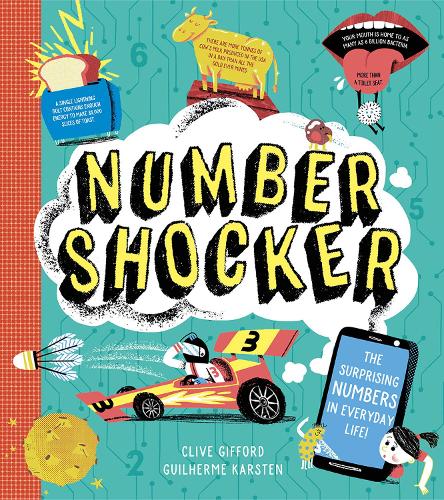
Number Shocker
(Paperback)
Publishing Details
Number Shocker
By (Author) Clive Gifford
Illustrated by Guilherme Karsten
HarperCollins Publishers
Red Shed
29th November 2022
28th April 2022
United Kingdom
Classifications
Children
Fiction
Childrens / Teenage social topics: Environment, sustainability and green issues
Childrens / Teenage general interest: Ecosystems
Childrens / Teenage general interest: Science: the Elements, crystals, chemistry
Childrens / Teenage general interest: Communities, places and peoples
Childrens / Teenage: Gift and novelty books / items
Childrens / Teenage general interest: General knowledge and interesting facts
Childrens / Teenage general interest: Mathematics and numbers
Childrens / Teenage general interest: Science: The human body
500
Physical Properties
Paperback
32
Width 245mm, Height 275mm, Spine 3mm
220g
Description
A fun and fascinating book for children aged 6+ who love facts about science, technology, animals, sports, the human body and the environment
See the world like never before and surprise yourself, your family and friends with astounding facts on a wide range of hot topics and favourite subjects.
Did you know . . .
Theres more bacteria in your mouth than on a toilet seat!
As many as 70 chemical elements make up a smartphone but only 6 elements make up 99% of your body!
If you squeezed all of Earths history into 12 months, humans only turned up 36 minutes before the end of the year!
Over 1 MILLION plastic bottles are bought every minute, but fewer than one in ten bottles are recycled!
Featuring bold illustrations, each turn of the page is a poster-worthy explosion of colours, making NUMBER SHOCKER the perfect gift for children with a thirst for knowledge about the world.
Author Bio
Clive Gifford is an award-winning writer whose first book was published at the age of seventeen. He has received commendations from PBS, the Smithsonian Museum and NAPPA and received the TES Information Book of the Year award. He has also worked as a features writer for Real Robots magazine. He has written over 80 non-fiction books including Inside Robots (Dorling Kindersley), The Kingfisher Encyclopaedia of Motorsport, How to Live on Mars, (OUP) and How the Future Began (Kingfisher).
